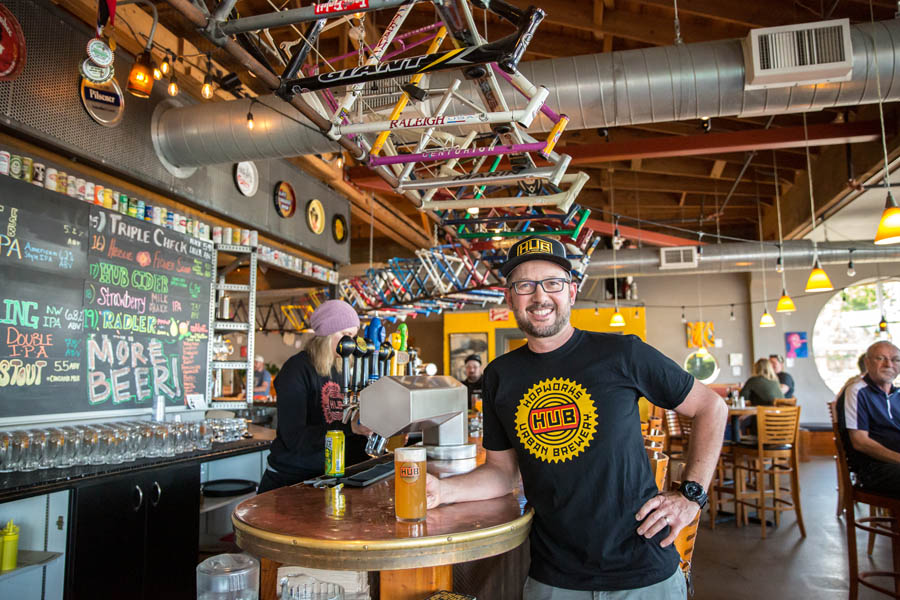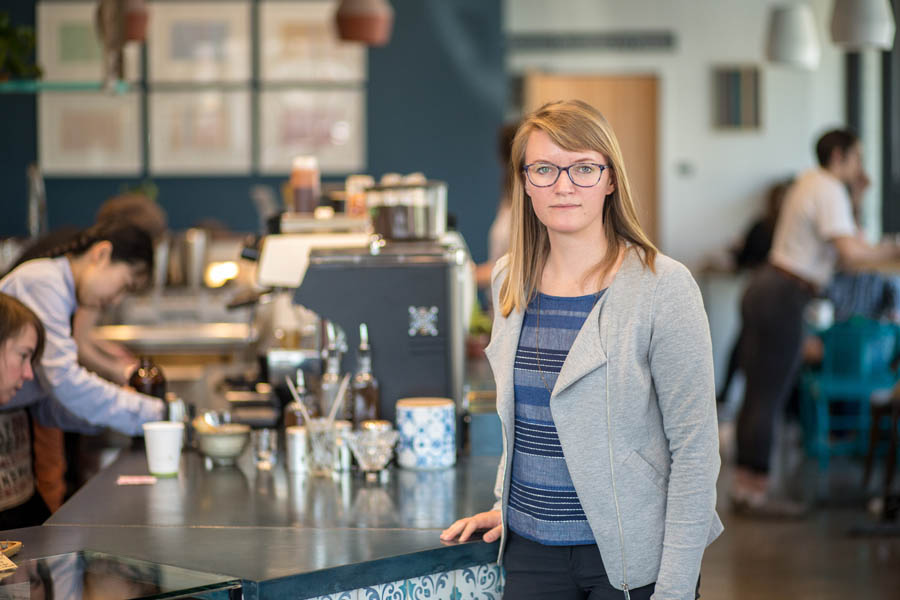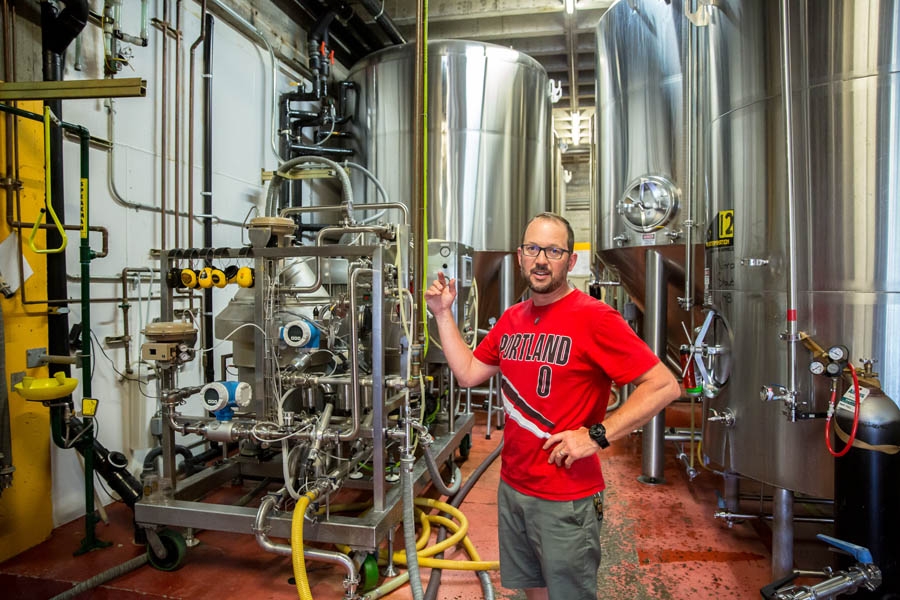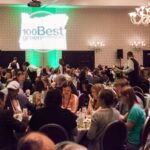Why businesses are rethinking what it means to be sustainable
Back when Hopworks Urban Brewery opened in Portland 11 years ago, brewmaster and company founder Christian Ettinger was on the cutting edge of sustainability.
The company’s first pub and brewery on Southeast Powell Boulevard used reclaimed materials from the building’s previous life as a bulldozer showroom. Ettinger built ample bicycle parking and installed high-efficiency equipment throughout the facility, including the brewery chiller.
The beer itself is brewed with organic ingredients and salmon-safe practices — even the grain used in the brewing process gets repurposed as organic cattle feed. The food served at the pub is sourced locally, and 1% of sales goes toward environmental causes.
It wasn’t quite enough.
In the 11 years since opening, Ettinger says, his definition of sustainability has evolved with the business. While he once saw being a green business almost solely through an environmental lens, he now sees it as just a part of a comprehensive sustainability strategy.
Now being green also means rethinking hiring practices to employ a diverse workforce, as well as finding ways to offer health insurance and retirement benefits to his 160 co-workers.
“It’s a brave new discussion that we’re having, that has transcended green buildings and organics and is now talking about diversity and inclusion, equity, and all these really kind of complicated subjects that we weren’t even necessarily aware of or talking about,” Ettinger says.
“We’re having those discussions every day about the social side, like how do we provide a 401(k) and all of this organic beer?”
 HUB’s Christian Ettinger
HUB’s Christian Ettinger
Not too long ago, being a green business required little more than having a few recycling bins in the employee lunchroom and energy-efficient light bulbs. Maybe there was an annual bike-to-work event, or if a company had ambitious sustainability goals, it bought carbon offsets and leased space in a LEED-certified building.
Welcome to the new green, one that requires even the most thoughtful businesses to not only rethink sustainability but to redefine what they — and their shareholders and investors — think of as success. More and more, a green business isn’t just environmentally focused.
It’s also thinking about equity, diversity and inclusion, social goals that expand the definition of what it means to be a sustainable workplace. Oregon, with some boundary-pushing sustainability pioneers, has been at the epicenter of those discussions.
“I love the green, I love everything about environmental stewardship,” says Kristen Connor, a senior vice president at Heritage Bank as well as the company’s community impact officer. “But to me, that’s not quite enough. If we’re a business and business is always supposed to be innovative, and we’re always supposed to be entrepreneurial and we’re always supposed to be ahead of the curve and ahead of the game, how do you do that if you’re not also innovating in the landscape of what you look like as a workplace?”
Companies that want to broaden their definition of sustainability can start by asking themselves what equity looks like in their hiring practices and in their client base, Connor says.
“Particularly for us as a bank,” she says. “How are we making sure that we are catering to every business out there? Whether you’re coming from a community of color, you’re a mom-and-pop shop, you’re looking for a small-business opportunity, or you’re a huge corporation. How are we being good stewards to all of those different people in our world, particularly in Oregon?”
The clamor to do more than just recycle and compost started just a few years back, says Kim White, the program manager with the City of Portland’s Sustainability at Work program. The city offers businesses a sustainability assessment, with three levels of green certification. Over the years, the city has mostly focused on recycling, composting and building efficiencies. But after a decade or so, many of the early adopters plateaued. They began to ask the city what else they could do.
“And the place for them to go was to start thinking around the social-sustainability piece,” White says. “What was missing for a lot of the certification programs early on was the people part. How do you sustain your community, what is the business’s role in helping the community, and how does the business sustain the community through its own hiring and retention practices?”
Big investors are thinking about this too, says sustainability consultant Mike Wallace, a partner with BrownFlynn, as well as the executive director of the Social and Human Capital Coalition. Many of the most recent corporate social-responsibility goals have evolved out of the Sustainable Development Goals developed by the United Nations. The 17 goals range from ending poverty and hunger to taking action on climate change and promoting gender equality.
“They were meant for nation states to address these topics,” Wallace says. “But in actuality, large corporations are addressing the SDGs [sustainable development goals]. Nike and Adidas right here in Portland are looking at the SDGs and saying, ‘What do we contribute, or how do we impact positively or negatively on these things?’”
Wallace points to the influence of BlackRock, one of the world’s largest asset managers and investors, which told the world’s largest companies last year that to prosper over time, they must not only deliver financial performance but also show how they make “a positive contribution to society.”
Much of the momentum on social sustainability in Oregon comes from the state’s active B-Corp community, a group of businesses that have officially reorganized their corporate structure as benefit corporations. By definition, B-Corps use profits and growth as a means toward a greater end, one that provides a positive impact for their employees, communities and the environment. It’s often described as a triple bottom line: profits, people and the planet.
National apparel retailers such as Patagonia and Athleta have organized their businesses in this way, as have large food producers like Danone North America. But so have many larger local businesses in the Northwest, such as New Seasons Market, Grand Central Bakery and the Neil Kelly construction company.
What these companies have in common is a desire to redefine business success as something that benefits an entire community and the planet, not just shareholders, says Karen Lickteig. She manages communications for Nossa Familia Coffee and is active in B Local PDX, a networking organization of like-minded B-Corp businesses.
“Literally, B-Corp, at the base of it, is about questioning the traditional structure of shareholder primacy.” Karen Lickteig
“Portland and Oregon have always been very progressive when it comes to business and the idea of rethinking traditional capitalism and organizing around that idea,” Lickteig says. “Literally, B-Corp, at the base of it, is about questioning the traditional structure of shareholder primacy.”
The designation is appealing to businesses that already function with environmental and social purpose at their core, Lickteig says. It brings in an independent assessment and certification to verify that businesses really are, as they claim, taking care of the planet and their employees in a holistic way.
Nossa Familia’s owner, Augusto Carneiro, first heard about the process from Sustainable Harvest, one of his coffee suppliers and an early B-Corp adopter in Oregon.
“It really spoke to practices that he was doing already — and what he aspired to do and be as a business,” Lickteig says. “What we’ve found is that it’s constantly pushing us to be a better business. Even just going through the assessment, you learn what good practices are. And even if you can’t check a box, you’re like, ‘We really should be checking this box, we want to get more points on this question. What can we do to make our business even better?’”
 Karen Lickteig, marketing and sustainability director at Nossa Familia Coffee, in Seven Corners Cafe, Portland
Karen Lickteig, marketing and sustainability director at Nossa Familia Coffee, in Seven Corners Cafe, Portland
Of course, even the most well-intentioned companies can’t do everything. Heritage Bank, for example, can’t become a B-Corp because its state charter as a financial institution prohibits it. Since it is a publicly traded company, it also has to get shareholder approval, which would be difficult, expensive and may not appeal to shareholders who invested in the bank expecting it to maximize profits.
Many B-Corps have found that even if they’re able to nail the environmental part of their mission, the social part is far more challenging. Nossa Familia, for example, had to find a way to offer health insurance to more of their 45 employees before it could get certified.
They and other B-Corp companies must also retrain how their customers think about their own consumption practices. Sometimes, for example, buying from a B-Corp is more expensive. They require consumers to make conscious decisions about spending.
On Earth Day, Nossa Familia put in place a new surcharge at all of its locations. Anyone purchasing coffee in a single-use takeaway cup now has to pay 25 cents for it. People who bring in their own reusable cups or who stay to drink their coffee from the cafe’s own cups are exempt from the surcharge.
The company tested out the policy first at their Division Street location in Portland and have found so far that about one-third of people will get a to-go cup when they have to pay for it. When they aren’t paying for it, about two-thirds of customers order their coffee in single-use to-go cups.
The money from the surcharge will go toward buying carbon offsets to help Nossa Familia move toward a carbon-neutral certification. The idea is to educate consumers that their practices have an actual cost, Lickteig says.
“We just want to encourage people to think more consciously about the decision they’re making,” she says.
 Matcha latte from Nossa Familia Coffee
Matcha latte from Nossa Familia Coffee
Low-margin businesses such as hospitality only have a finite amount of resources, says Ettinger. That makes it challenging to tackle sustainability in all its definitions, all the time.
“In some cases, we kind of maybe doubled down on organics and maybe didn’t talk about social issues or benefits enough,” he says. “And then you look at the net income and you’re like, ‘Why? Why did we do this sometimes?’ And you’re like, ‘You know, it’s the right thing to do, but we don’t have to do everything.’ So let’s choose, let’s make some hard decisions and choose where the resources are best put.”
Like many of his peers who run a B-Corp, Ettinger is eager to redefine success by demonstrating there are sustainable business models, even for public companies.
“Ultimately, the metrics have to change,” he says. “What if business success was measured on the amount of money that they gave away to social and environmental nonprofits versus the amount of money they put in their investors’ pockets? You change the metrics, then success has a new definition.”
Big businesses are taking note. In 2018 Lam Research, a global microchip company with 3,000 employees in Oregon, created a corporate-social responsibility team that includes Jami Haaning, a leader in local sustainability efforts and a founding member of the regional Corporate Sustainability Collaborative.
Lam added managers to lead the corporate social-responsibility program and the company’s inclusion and diversity efforts.
The team guides Lam’s corporate-responsibility goals and activities, and most importantly, measures their effectiveness, says Tina Correia, Lam’s corporate vice president of communications and investor relations.
“It’s a brave new discussion that we’re having, that has transcended green buildings and organics and is now talking about diversity and inclusion.” Christian Ettinger
The business case for social capital investments — the people part of sustainability — has become increasingly clear, Correia wrote in an email. And the goals and objectives for environmental and social issues are increasingly “aligned and intertwined,” she says.
“For example, addressing climate change has a lot to do with protecting the most vulnerable populations who will likely be impacted first,” Correia says. “We try to continuously appreciate and recognize how interconnected so many of these issues are, and how critical a cross-functional thinking and approach is to achieving quality outcomes.”
At Ruby Receptionists, front-line employees were responsible for many of the green initiatives that led to the company earning gold sustainability status from the City of Portland. The company, which employs 635 people, provides virtual-receptionist services to small businesses around the country.
A big piece of their evolving corporate social-responsibility mission is “how we take care of our people,” says Stephanie Copeland Weber, the company’s chief operations officer.
“For us, people are the heart of our business,” she says. “They deliver our customer experience day in and day out. And so for us, it really comes down to taking great care of our people so that they take great care of themselves and take great care of our customers and their customers. For us green includes people, and both our own employees as well as the community around us.”
In 2015 Ruby bumped its starting pay to $15 an hour; it’s now at $15.50. Last year, they brought in a Portland-based consultant, Future Work Design, to help consider its equity, diversity and inclusion strategies. They want to arrive at a place where all of their managers have gone through a round of equity, diversity and inclusion training that looks at unconscious bias, pay equity and other issues, she says.
“The next level is how do we actually use that as a strategy to our advantage?” Copeland Weber says. “We have 635 people with very unique and diverse backgrounds that bring great perspective. How do we give them an environment that is safe and open for expressing those ideas, and helps us rise up and be an even better company?”
For businesses feeling overwhelmed about managing the new definitions of sustainability, entrepreneur Mara Zepeda, co-founder of the Portland-based software company Switchboard, has some advice.
“There is not a business that is not a social-impact business,” she says. “The question then becomes: How are you impacting society? And from that vantage point, you can start to ask questions around how you’re making decisions from a values-based perspective.
“Every business should be having these conversations, and then answering questions around worker ownership, equity, inclusion, diversity, social impact, environmental impact, sustainability,” she says.
In 2017 Zepeda helped start a worldwide movement called Zebras Unite, a slow-capitalism movement that eschews venture capital funding in favor of slower, more organic growth for startups. With 45 chapters on six continents, the Zebra movement rejects the idea that all companies have to be so-called unicorns, like Uber or Facebook.
“One thing that businesses can do if they want to promote sustainability is to really reassess their exposure to venture capital, because it’s not an equitable tool,” she says. “It’s very rare that you actually have venture stories that are successful for local communities.”
Zebras are often considered too slow to attract venture capital — or don’t want to be tied to investor demands. And they’re too “fast” for banks. The Zebra movement was born out of the lived experience of many Oregon entrepreneurs she met, she says, especially women and minorities who were excluded from the entrepreneurial ecosystem.
Many are also the sort of companies whose owners have given quite a bit of thought to their social impact, Zepeda says. They want slower growth so they can be a sustainable part of the community.
Ultimately, businesses will have to figure out their place on the evolving sustainability spectrum. It’s changing fast — both Zepeda and Ettinger predict that within a few years, it will be standard practice for businesses large and small to consider equity and other social factors in their sustainability work.
Nonetheless, Ettinger likes to take the long view. Beer, he says, is part of a 9,000-year-old conversation about sustainability. It’s an easy entry point for people who may not have given the concept of social sustainability much consideration.
“Beer’s done a lot of the heavy lifting in sustainability,” he says. “First of all, it gets people together. And if you put some thoughtful ingredients and practices in front of people and they start talking about that, maybe they start thinking about just how spending their dollar on that beer — versus conventional beers — is a win.
“When you’re in here, you’re soaking in sustainability and may not know that it’s kind of influencing you,” he says of his pubs. “But we hope it is.”
The U.N.’s Influence on Sustainability in Business
Sustainability in business has a long history, but one of its most recent influences on corporate social responsibility emerged from the Sustainable Development Goals developed by the United Nations in 2016.
The U.N. describes the goals as “a universal call to action to end poverty, protect the planet and ensure that all people enjoy peace and prosperity.”
The 17 goals go way beyond green — they range from ending poverty and hunger to taking action on climate change and promoting gender equality. The idea is that the goals are interconnected and that success in one area involves “tackling issues more commonly associated with another,” the U.N. says.
Local businesses have zeroed in on the interconnected nature of the sustainability movement, says Cameron Madill, owner and founder of PixelSpoke, a digital marketing agency in Portland that’s organized as a B-Corp.
“You can’t really talk about justice and social equity without paying attention to some of the things that are happening from an environmental standpoint,” he says. “There’s just kind of a broader awareness that maybe just paying a living wage is not enough. Or being a carbon-neutral business is not enough, and that we need to be looking more holistically at the positive and negative impacts of any organization.”
Photos by Jason E. Kaplan







